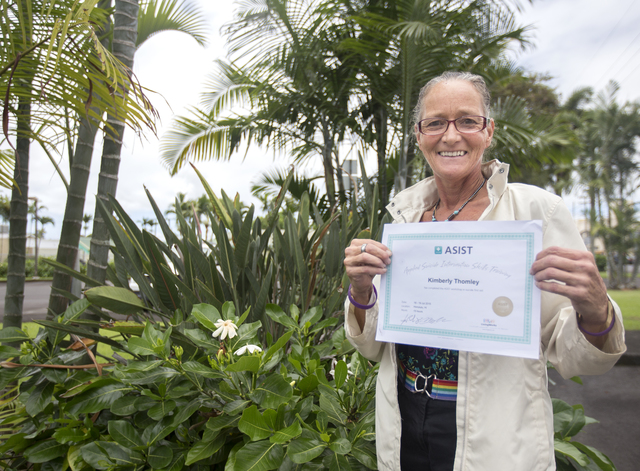The pain and guilt triggered by the loss of a loved one has been a recurring theme in the life of Glenwood resident Kimberly Thomley.
The 55-year-old’s battle with depression began in earnest following a 1991 divorce, soon followed by the death of her 2 1/2-year-old son from a brain tumor.
“I never got therapy from it,” she said.
Then, in 1994, she lost another child — 12-year-old Akira Makai — to a traumatic asthma attack.
“I started to drink heavily,” she said, “which is very common for people thinking about suicide. They turn to alcohol to kill the pain.”
As she talks about her life in hindsight, Thomley can see all the red flags as clear as day. But at the time, she was caught in the “tunnel vision” of her own grief and self-loathing.
“I became more and more depressed. At the time, I was teaching. And then one day, I just didn’t get out of bed. … I stayed in bed and isolated myself,” she said.
She shared her thoughts with no one.
“I didn’t want to be a burden on them. Another red flag. I felt I was a terrible burden,” she said.
Her mother, with whom she was living at the time, attempted to help, but instead just enabled Thomley to continue her self-destructive behavior.
“She would teach my classes for me,” she said.
She felt hopeless and soon felt like there was no way out of her despair.
“I was living in constant pain and guilt,” she said. “I started to not care about how I looked. My appearance no longer mattered. And the drinking increased, to the point where I was diagnosed as an alcoholic.”
That was when she gave in to her dark thoughts and tried to kill herself.
She asked that the Tribune-Herald not reveal the methods by which she attempted suicide, saying she feared it could convince someone else to try the same thing.
But, she said, “I came very close to following through.”
She was taken to the emergency room at the hospital, where she was treated and then transferred to the psychiatric ward, where she was given a prescription for anti-depressants.
But sadly, she said, Thomley was never offered any kind of follow-up counseling.
Her old feelings of sadness, anger, grief and hopelessness returned, and were now compounded by feelings of guilt over the pain she had caused her family, including her remaining son, by attempting to kill herself.
“I could barely live with myself knowing what I had done,” she said.
Again she attempted to take her own life, and again she received medical attention for her immediate wounds, but no counseling. After the second attempt, she went right back into her old patterns, walling herself off from others.
“I was so distressed, I was unable to see I had other options,” she said. “I lost all interest in what I loved. Gardening, playing the guitar, fishing. Everything that gave me joy, I stopped. Everything that could be called self-care ended. I felt guilt for my students, my parents and friends. And the guilt knowing my son would know about all this one day. But I couldn’t turn back by then.”
It was love that kept her going, however. Her son and his friends in the neighborhood became a support system. Her thoughts of suicide continued, but weekend fishing trips with the kids and other activities acted as road markers, holding off what she felt as the inevitable for one more week.
“They would talk to me. They would say, ‘Aunty, I love you. You’re the best Aunty I’ve ever had,’” she said. “I started to realize I was important to them. … They would make plans, and that stopped me. Because I knew I needed to wait until the next weekend. Slowly, I got out of it.”
Realizing that she was stuck between “wanting to live and wanting to die,” Thomley checked herself into the Hina Mauka addiction recovery center on Oahu for her alcoholism.
While on Oahu, a doctor gave her the best advice she could have asked for, she said.
“I’ll never forget it. He put his hand on my shoulder. And he held my head up by my chin, to make eye contact. And he said, ‘When you get home, go to hospice,” she said.
Upon arriving back on the Big Island, Thomley made her way to Hospice of Hilo, where she received free counseling to deal with her depression and suicidal thoughts.
“I attended all of the events at the hospice,” she said. “They actually have a group only directed at suicide survivors. … There were times when the heartbreak started again … but I had found my safe place. I got actively involved with what was going on at Hospice.”
It’s been 10 years since she’s had a drink, she said, and she continues to wrestle with her depression. But now she feels like she has a handle on her demons.
“I feel like things are better,” she said. “Now I’m doing well. I’m getting into the green zone. I’m in a remarkable relationship. I had that turning point, and now things are getting better.”
Thomley says her biggest test came in September 2013, when her beloved nephew Paul committed suicide.
But this time, instead of internalizing her pain, she directed it in a positive direction.
“My counselor actually recommended me to join the Suicide Prevention Task Force,” she said. “I went through all the training. Through my involvement with hospice and the task force, I felt empowered to help others. And it’s been incredible. Absolutely incredible.”
Now Thomley helps others wrestling with suicidal thoughts in ways that she wishes someone had been able to help her when she was at her lowest.
“Now, I’m showing that Paul did not die in vain,” she said.






